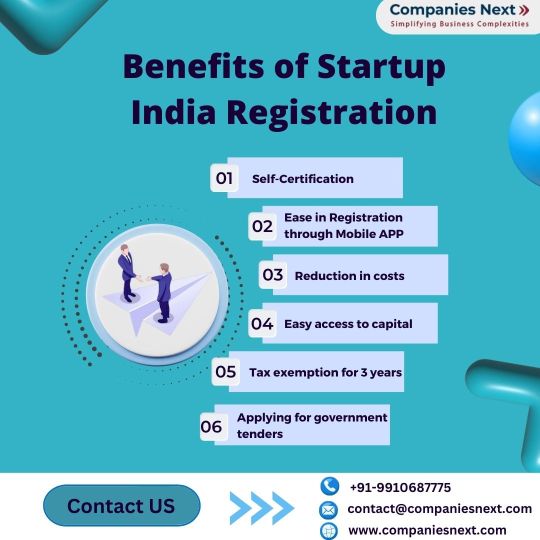#startup india registration
Text
Streamlining Company Registration in India: A Step-by-Step Guide

India, with its burgeoning economy and dynamic market, is an attractive destination for businesses looking to expand their global footprint. Setting up a company in India offers access to a vast consumer base, a skilled workforce, and a rapidly growing market. This comprehensive guide will take you through the step-by-step process of company registration in India, providing insights into India's launch strategy and the opportunities it offers to foreign investors through Foreign Direct Investment (FDI).
Why Invest in India?
Before delving into the registration process, it's essential to understand why India is a prime destination for business expansion:
1. Large Consumer Base: India's population is over 1.3 billion, making it one of the largest consumer markets in the world. This provides ample opportunities for businesses in various sectors.
2. Skilled Workforce: India is known for its educated and skilled workforce, making it an ideal location for industries that require a pool of talented professionals.
3. Growing Economy: India's economy is consistently growing, and it is expected to become the world's third-largest economy in the near future. This presents lucrative prospects for investors.
4. Ease of Doing Business: The Indian government has introduced several initiatives to simplify the process of setting up and doing business in India.
Step-by-Step Guide to Company Registration in India
Setting up a business in India involves several steps. Here are the steps-
Step 1: Choose the Business Structure
India offers various business structures, including sole proprietorship, partnership, limited liability partnership (LLP), private limited company, and public limited company. Select the one that aligns with your business goals and needs.
Step 2: Obtain a Digital Signature Certificate (DSC)
Get a digital signature certificate which can be used for various transactions.
Step 3: Obtain a Director Identification Number (DIN)
A DIN is required for corporate directors. It is a unique number that is used to identify them in the MCA's database. A DIN can be obtained online.
Step 4: Choose a Unique Name for Your Company
The name you choose for your business must be distinctive and not infringe on any existing trademarks. Your company's name should also represent its essence.
Step 5: Register for Goods and Services Tax (GST)
You must register for GST if your business falls within its purview. The Goods and Services Tax (GST) is a single tax system that replaces multiple indirect taxes.
Step 6: Prepare the Incorporation Documents
You need to prepare the following documents for incorporation:● Memorandum of Association (MoA): It outlines the company's objectives and rules.
●Articles of Association (AoA): It contains rules and regulations for the company's internal management.
●Declaration of Compliance: This document confirms that all legal requirements are met.
Step 7: File an Application for Incorporation
You can apply for incorporation through the Ministry of Corporate Affairs' online site. Submit the necessary documents and pay the costs.
Step 8: Receive the Certificate of Incorporation
You will be issued a Certificate of Incorporation after your application has been accepted. This certificate certifies that your business is legally registered.
Step 9: Register for Permanent Account Number (PAN) and Tax Deduction and Collection Account Number (TAN)
PAN is a unique identification number for your business, while TAN is essential if you need to deduct or collect taxes. You can apply for both online.
Step 10: Open a Bank Account
To operate your business, you will need to open a bank account in India. This account will be used for financial transactions, salaries, and tax payments.
India Launch StrategyOnce your company is registered in India, it's essential to develop a robust launch strategy to ensure a successful entry into the market. Here are some key elements to consider:
1. Market Research: Thoroughly understand the Indian market, including consumer preferences, competition, and regulatory requirements.
2. Local Partnerships: Collaborate with local partners to navigate the market and gain insights into consumer behavior.
3. Digital Presence: Create a strong online presence by creating a website, using social media, and using e-commerce platforms. Many Indian shoppers use the internet to research and buy products.
4. Local Marketing: Tailor your marketing and advertising campaigns to the local audience, considering cultural sensitivities and preferences.
5. Logistics and Supply Chain: Efficient logistics and supply chain management are critical in a vast and diverse country like India. Ensure timely and reliable product deliveries.
6. Compliance: Stay updated on local laws and regulations to ensure compliance with tax, labor, and business laws.
Opportunities for FDI in India
India actively encourages Foreign Direct Investment (FDI) through various sectors, including:
1. Manufacturing: The "Make in India" initiative promotes investments in manufacturing, offering incentives and reducing bureaucratic hurdles for foreign manufacturers.
2. Retail: India's retail sector is growing, and FDI is allowed in single-brand and multi-brand retail.
3. Information Technology: The IT and software services sector welcomes FDI, contributing to India's position as a global IT hub.
4. Pharmaceuticals: The Indian pharmaceutical industry is a global leader, offering significant investment opportunities in manufacturing and research and development.
5. Infrastructure: Investments in infrastructure projects, such as roads, airports, and ports, are essential for India's development.
6. Renewable Energy: India is committed to increasing its renewable energy capacity, making it an attractive sector for FDI.
As we reach the culmination of this comprehensive guide on company registration in India, it becomes evident that the Indian business landscape holds immense promise and potential for investors and entrepreneurs. India, with its rapidly growing economy, large consumer base, and pro-business policies, is a beacon of opportunity in today's global market. The step-by-step process of company registration serves as a roadmap for those considering an entry into this vibrant and diverse market.
The primary question that arises at this juncture is why invest in India? What sets India apart as a destination for business expansion and investment? The answer to these questions lies in several key factors.
India's Market Potential
India's market potential is colossal, with over 1.3 billion people. The demographic diversity in terms of age, preferences, and needs makes it a testing ground for products and services across industries. Whether you are in technology, healthcare, consumer goods, or any other sector, India's vast consumer base is brimming with potential.
Skilled Workforce
India has a well-educated and highly skilled workforce. It is the largest English-speaking country in the world, making it easier for foreign businesses to communicate and operate. The availability of skilled professionals across various domains, from IT to healthcare, is a significant asset for businesses.
Growth Opportunities
India's economy is consistently growing, and it's expected to become the third-largest in the world in the near future. This growth is driven by a combination of factors, including increased urbanization, infrastructure development, and a rising middle class with greater disposable income. As the economy expands, so do the opportunities for businesses.
Pro-Business Policies
The Indian government has introduced a range of pro-business policies and initiatives to simplify the process of setting up and running a business in India. These policies aim to reduce bureaucracy, promote ease of doing business, and attract foreign investment. The "Make in India" campaign, for instance, encourages foreign companies to invest in manufacturing in India.
FDI Opportunities
India actively encourages Foreign Direct Investment (FDI) across various sectors. Whether you're interested in manufacturing, retail, information technology, pharmaceuticals, infrastructure, or renewable energy, there are FDI opportunities waiting to be explored. The Indian government's commitment to welcoming foreign investment adds to the appeal of the Indian market.
Challenges and Considerations
While India holds great potential, it's important to acknowledge the challenges and considerations that come with setting up a business in this diverse and complex environment.
Regulatory Complexity: India's regulatory landscape can be complex, with various laws, taxes, and compliance requirements. Navigating these regulations and staying updated is crucial.
Cultural Sensitivity: India is culturally diverse, and what works in one region may not work in another. Understanding and respecting local customs and preferences is essential for effective market entry.
Infrastructure: India's infrastructure varies across regions. Ensuring efficient logistics and supply chain management is vital, especially if your business relies on timely product deliveries.
Market Research: Thorough market research is indispensable to understand consumer behavior, competition, and the specific needs of your target audience.
Strategic Entry: Developing a robust India launch strategy is crucial. Consider factors like local partnerships, digital presence, and local marketing campaigns tailored to the Indian audience.
Compliance: Staying compliant with local laws and regulations, including tax, labor, and business laws, is essential. Compliance ensures a smooth and lawful operation of your business.
The Path Forward: Seizing Opportunities
In conclusion, India's business landscape is an exciting terrain of opportunities and challenges. For those willing to navigate this landscape with determination, resilience, and a well-thought-out strategy, the rewards are boundless. Whether you are a startup looking to explore new markets or a multinational corporation seeking to expand your global footprint, India offers a rich and diverse marketplace that is open to innovation and investment.
Company registration in India, as outlined in this guide, is not merely a legal process but the first step in a transformative journey. It is a journey into a market that is continuously evolving, offering opportunities for those who dare to innovate and contribute to India's economic growth and development. It's a journey into a land of immense possibilities, where every step forward is a step toward shaping the future of a nation and the world.
This post was originally published on: Foxnangel
#startup india registration#register a startup in india#company registration in india#register a company in india#business registration in india#foreign direct investment#fdi in india#fdi investment in india#invest in india#investment in india#foxnangel
1 note
·
View note
Text
Startup Registration India: Blueprint for Entrepreneurs

People may have ideas, but many of them do not know how to set up a company or convert the idea into a business venture. People don’t know how to register their business as a startup. Some people don’t even know if their company qualifies as a startup. With this in mind, we have created a blog post to help you by explaining the eligibility criteria for the Startup Registration India and the process of registering your company.
Before diving into qualifications and how the process works, let’s understand what Startup Registration India is.
For More Information About Startup India Registration
0 notes
Text

A DSC or ID is also referred to as a digital signature certificate online. To digitally sign official documents, the issuing authority must possess an active digital certificate. A digital certificate is issued by a certificate authority. Third-party certificate authorities offer the option to either purchase a DSC online or apply for a digital signature online. The risk of duplication or alteration of the signed document can be minimized by Digital signatures. DSC users are provided with a unique token password to authenticate, verify their identity and sign the respective document
#llp registration#private limited company registration#opc registration#startup india registration#trademark registration#annual compliance of llp#annual compliance of private limited company#itr filing#tds return filing#digital signature certificate online#legal advisers#legal consultation#legal services
0 notes
Text
How To Register Your Startup Brand With Muthirai?
Based on the Trademark Act 1999, any startup India registration can be done by the business owners. At Muthirai, we understand that protecting your brand name and logo is a crucial aspect of your startup business. Hence, we make it as seamless as possible. The trademarks are unique signs that identify goods or services. This is essential that differentiates you from other huge numbers of competitors in the market. By having a trademark, you have exclusive ownership and legal rights over all the brand identities.
With Muthirai, you get assured guidance and support from experts. The entire trademark procedure is done here in a hassle-free manner.
Your startup brand Trademark registration with Muthirai
1. Trademark Search
It is important to choose a unique name that represents your brand. However, it shouldn’t be previously used by any other business. It can be accomplished by searching on the portal https://ipindiaonline.gov.in/tmrpublicsearch/. Our experts will give great suggestions without levying any fee.
2. Checklist
The next step is to file the checklist. We will prepare the document that doesn’t need any ID or address proof. The soft copy of the logo will be sent through email.
3. Trademark Application Filing
Once uploaded all documents, then start the trademark application filing process. We will process the trademark application process on your behalf and submit the necessary documents. Typically, within 3 days, a trademark application number will be issued.
4. Trademark examination
In the Trademark process, after the filing is completed, a thorough examination will be done by the Registrar. An examination in writing will be prepared and you will receive a copy of it. Post 2-3 months of application filing, an examination will be done.
5. Publication of your brand
Once the process of examination is finished, your trademark gets published. The trademark that you receive is valid for 10 years.
By choosing Muthirai for your trademark registration, you get the best support for the process. We conduct a thorough search in the TM directory, help in preparing the documents, file the application and make constant moves to make the trademark registration process successful.
#startup India registration#Muthirai#trademarks#brand identities#trademark procedure#trademark application#Trademark process#application filing#trademark registration#TM
0 notes
Text

#startup India registration#process of startup registration in India#document required for startup registration in India#Benefits of startup registration
0 notes
Text
#startup India registration#startup India registration online#startup India registration process#startup India registration documents#startup India registration eligibility#startup India registration fees#and startup India registration duration.
0 notes
Link
It is simple to register for a startup, and you can do it online.
Step 1: Register on the Startup Website
Step 2: Submit an application for DPIIT Recognition
Step 3: Submit the Necessary Paperwork
Step 4: Get Recognised
The ideal option for Startup India Registration is eAuditor Office. We are a reputable business with years of expertise helping startups with registration and compliance. We have a team of professionals that can assist you swiftly and easily register for the Startup India Scheme by guiding you through the full procedure.
#startup india registration#DPIIT registration#startup india registration fees#startup registration process#DPIIT startup registration#DPIIT certificate#startup india registration online#Startup India Online Registration
0 notes
Text
Startup India Registration Fee | Bizexpress
Start Up Registration process in India
India is one of the fastest growing economies in the world. This means that there are plenty of opportunities for businesses to get started. BizExpress is a website that provides a simple registration process for businesses interested in starting up in India. The website is easy to navigate and has detailed instructions on how to complete the registration process. There is also a helpful forum where business owners can ask questions and get advice from other users.
What is the Startup registration process in India?
In India, startup registration process is pretty straightforward. You need to pay a registration fee and submit some documents. However, there are some key things to keep in mind when registering your startup in India. Here are the steps:
1) First and foremost, you will need to pay the startup registration fee. This can be done through paying online or through visiting any of the designated startup registries across the country. The fee amount varies depending on the region you are registering your startup in but it should not exceed Rs 20,000 (~$300).
2) After you have paid the startup registration fee, you will need to gather certain documents and submit them with your application.
Requirements for Start Up Registration
1. India is now a startup nation and with good reason. With the right policies in place, India has all the potential to become one of the world's leading startup hubs.
2. The Indian government has made strides in recent years to make it easier for startups to get started, and there are now a number of requirements that need to be met in order to register as a startup.
3. While these requirements vary from state to state, there are some commonalities that all startups need to adhere to in order to start up legally in India.
4. One important requirement is that startup companies must have a written business plan and an official registration certificate from the state authorities.
How to Register a Startup in India
Startup India Registration Fee is the most affordable online startup registration platform in India. We are the only company to provide 100% guarantee on our work, which means we will revise your EIN number for free if you do not get it the first time around.
There are a few ways to register a startup in India. The most common way is to submit an online application form through the Ministry of Corporate Affairs website. The startup must also provide documentation that proves its business model, such as a business plan, financial statements, and articles of association. In addition, the startup must provide information about its management and key employees. Finally, the startup must pay a registration fee of Rs 25,000 ($390).
Another way to register a startup is to contact the Department of Industrial Policy and Promotion (DIPP) for assistance. DIPP can help connect the startup with government officials and other businesses in India. The cost for DIPP's services varies depending on the size and type of company being registered.
To know more about Startup India Registration Fee, visit Bizexpress.
#startup india registration#Startup India Registration Fee#startup registration#startup registration india#bizexpress
0 notes
Text

Visit us for any help on Startup India Registration
BizExpress
#startup india registration#bizexpress#fund raising#trademark#gst registration#startup#finance#dpiit registration
0 notes
Text
Startup India Registration - leintelligensia
startup India registration, People are very interested in starting their own businesses, but funding, confusion and ignorance have become major barriers to entrepreneurship.
The government is offering plenty of schemes, subsidies and exemptions to encourage young entrepreneurs as it gives economic growth to the nation and a good reputation among other countries.
However, ‘Start-up India’ is one such scheme provided by the Indian Government. Through this article, we will learn about the process of startup india registration and benefits of the Startup India scheme.
What is a startup India registration?
Generally speaking, in colloquial language, every new entrepreneur will mention that they are a start-up, but can we call every new organisation a start-up? The answer is no.
“Only an organisation with innovative business ideas, products or services can be called a start-up.” Typically, a startup is a person or group of friends who set up a company and develop a product by investing a small amount of money.
What is the Startup India Scheme?
The Government of India launched a new programme called Startup India in 2016. The main motto of the scheme is to create a strong economic and supportive environment to help the growth of innovative startups in India.
Startup India has 19 beneficial action points such as incubation centres, intellectual property filing schemes, tax exemptions and many more advantages.
The main motive of the Startup India scheme is to “encourage entrepreneurs”. Through this scheme, the Indian government transforms job seekers into job providers.
Many investors show interest in investing in start-ups, while they also contribute their knowledge and involvement in startup companies, therefore, it takes start-up companies to the next level.
Top 5 Benefits of Startup India Scheme
1. Tax Exemption for first 3 years:
Start-ups will be exempt from income tax for the first three years. However, this benefit is only available after certification by the Inter-Ministerial Board (IMB for short).
2. IPR:
Intellectual property rights. Start-up companies can enjoy benefits from subsidies when applying for trademark and copyright registration. They will enjoy an 80% reduction in the cost of filing patents or Trademark Applications.
3. Incubator System:
Incubator cells help start-ups to kick start their businesses. Incubators offer many benefits to the owners of start-ups. Their offices and production space are available at below-market rates, their staff provide advice and much-needed expertise in developing business and marketing plans, and they help finance fledgling businesses.
4. Government Tenders:
Government projects are usually large and have high monetary incentives. However, it can be quite difficult to obtain one. But startup are given priority while giving orders.
5. Funding:
The Government of India has earmarked a reserve fund of Rs 10,000 crores. The fund is managed by the Small Industries Development Bank of India and aims to provide equity funding support for the development and growth of innovation-driven businesses.
Startup India Scheme Eligibility
It should be a Private Limited company or Limited Liability Partnership
The company formed should be a new one and it should not be more than 10 years old
To qualify under the scheme, the annual turnover of the company should not exceed Rs 25 crore.
All the companies which wish to join the Startup India Scheme should get approved by the Department of Industrial Policy and Promotion (DIPP).
The company should be based on the innovation or the development of a new innovative product or service.
Who are eligible for startup India?
Proprietorship firm
Unregistered Partnership firm
Turnover more than 25 crores
Company which is older than 10 years
Document needed for register under the startup India scheme
Company incorporation certificate
Brief description of the organisation
Details about the core team
Details about the IPR
What is the Process to register under startup India
In order to initiate the Startup Indian Registration process, there are a few preparations and procedures. We will explain this procedure to you in this section.
Step 1: Company Incorporation:
Before going for the startup India Scheme, you must first register a Private Limited or Limited Liability Partnership. Once the company is registered, you must obtain the legal compliances such as a PAN card in the name of the company, GST and other basic compliances to run the business.
Step 2: Submission of documents:
Once the company registration is complete, you can now register your company as a startup in the government’s Startup India scheme. The forms can be found on the government portal and you will need to create a login and then just fill in the form. In addition, submit the necessary documents and your business plan.
Step 3: Recognition Number:
Once you have created your login, you will now need to obtain approval by clicking the Submit button on the “Startup Recognition Form”.
Validity of the Startup India Scheme
A Startup company, on completion of ten years from the date of registration, or if the turnover of the organisation exceeds Hundred Crores then the organisation ceases the privilege of Startup.
Now you would have understood more about this topic. Thanks for reading the entire Article. Keep sharing this article to your friends who are in business or about to start their own Business. leintelligensia
0 notes
Text
Startup India Scheme: Benefits and Registration | Companies Next

Get your business registered and recognized under the Startup India scheme read the article and know about process, benefits and eligibility
know more: https://bit.ly/3vUDcaA
#Startup India scheme#startup india registration#startup india registration benefit#start business in India#companies next
0 notes
Text

MSMEs, which include micro, small, and medium-sized businesses, have emerged as a flourishing sector of the Indian economy in recent years, playing an essential role in the country's socioeconomic improvement. These businesses are very helpful in creating jobs, producing goods, and exporting products. The duty of promoting and encouraging the growth of MSMEs mainly falls under the state governments
#llp registration#private limited company registration#opc registration#nidhi company registration#msme registration#trademark registration#startup india registration#sole proprietorship#annual compliance of llp#annual compliance of private limited company#itr filing#tds return filing#iso certification online#legal consultation#legal advisers#legal services
0 notes
Link
#Startup India registration#startup india#startup india certificate#Startup India registration online#Startup India registration process
0 notes
Text
0 notes
